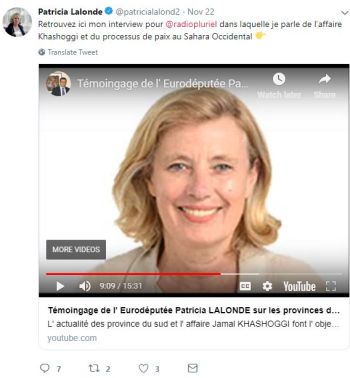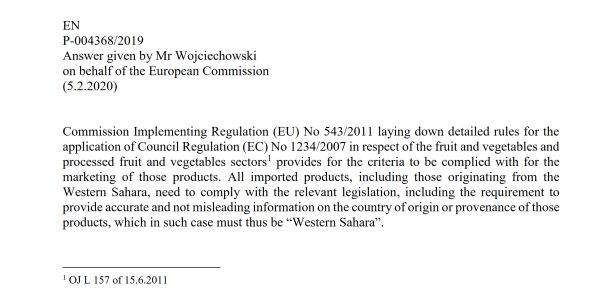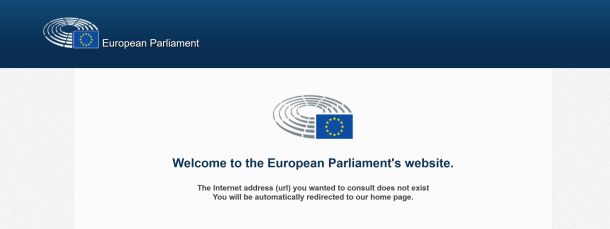
Amid investigations into potential breach of code of conduct due to her membership on the Board of pro-Morocco lobby group, MEP Patricia Lalonde resigned today as the European Parliament's rapporteur on the proposed extension of the EU-Morocco trade deal into occupied Western Sahara.
The resignation comes ahead of a crucial vote on the EU-Morocco trade pact in the European Parliament's committee on international trade (INTA).
The vote is to adopt or reject a proposed text that MEP Lalonde has drafted, to be presented before the plenary of the European Parliament in January. What is at stake is whether the European Union will enter into a new trade agreement with Morocco for the parts of the territory that Morocco is illegally occupying. The Court of Justice in 2016 concluded that no such agreement can be applied to Western Sahara, unless the Saharawis consent. Though the people of Western Sahara never consented to the proposed deal, MEP Lalonde states this has been taken care of - after she met a number of Moroccan interest groups who claim to represent the wishes of the people - such as Moroccan government owned companies.
While MEP Lalonde was already the European Parliament's rapporteur on the controversial proposal to extend the EU-Morocco Trade Agreement into occupied Western Sahara, she signed the founding statutes and became one of the Board Members of EuroMedA: a foundation fronting for Morocco, based in the office space of the Brussels offices of lobby firm Hill+Knowlton Strategies - which has the Moroccan state as one its biggest clients. MEP Lalonde's fellow Board Members include former Moroccan Ministers of State, and current top-ranking officials of Morocco's Ministry of Agriculture.
Lalonde radio interview

“We were in […] the South […] what is called the Southern Provinces”.
“The problems of Western Sahara will not be resolved by the European Parliament.”
“I have not been on the other side of the wall. I have only been in the autonomous provinces…of Morocco”
“There is the problem of consent of the populations. But you know, when you are employed, and you can benefit from income and economic development, in general, the populations are content”.
In the radio interview, Lalonde does not refer to the “people” of Western Sahara, as the court does, but to the “populations” – a very different term. Lalonde praises Morocco’s economic development and uses this as an argument for a new agreement for the territory. The terms “Southern Provinces” are used several times. Neither the EU nor the UN apply such biased terms. Only Morocco does.
Following these revelations in EUobserver, MEP Lalonde stepped down from the Board of EuroMedA, but did not hand in her resignation as EP rapporteur.
As rapporteur on the file, MEP Lalonde led a delegation of the INTA Committee to the occupied territory on 3-4 September 2018. She later presented a mission report on the trip. WSRW on 18 October wrote that it found Lalonde's mission report to be biased, to the benefit of Morocco. WSRW also wrote that the delegation to the occupied territory led by Lalonde was highly controversial in that it spent nearly all its time on meeting Moroccan interests, and that Lalonde herself had expressed her support for a new trade deal to Moroccan media already on the first day of the delegation's trip, without even having met Saharawis.
On 6 December, an internal investigation was launched against MEP Lalonde and three other MEPs over possible breaches of the Parliament's Code of Conduct, which requires MEPs to declare "before speaking or voting in plenary or in one of Parliament’s bodies, or if proposed as a rapporteur, any actual or potential conflict of interest in relation to the matter under consideration", regardless of "whether the membership or activity in question is remunerated or unremunerated". The investigation was initiated following a request from Greens/EFA.
Pressure mounted as two political groups - the Greens/EFA and the GUE/NGL - announced they would boycott the vote on the proposed trade pact.
The proposed deal has already slipped through Council (the Member States), mainly on the back of the claim by the EU foreign affairs branch EEAS that it has found that there is a "broad support" for the new deal in Western Sahara. Their methodology is weak, however, as the EEAS only consulted representatives of the Moroccan government, and pro-Moroccan individuals, such as individuals elected in Morocco's illegal elections on occupied land.
The EEAS claims to have “consulted” 112 associations and individuals. However only 18 of them (or 16%) – all Moroccan bodies – were in fact consulted by the EEAS, rendering the assertion of a “broad” support for a new trade agreement rather questionable. As MEP Lalonde had met with the exact same groups as part of her delegation, 91% of Ms Lalonde’s mission report was given to the position of 16% of the stakeholders allegedly consulted by the EEAS. The mission report did not refer to the 94 groups that the EEAS falsely claims to have consulted, except two. More space in the mission report is given to minutes from the meeting with the French Chamber of Commerce, than to meetings with Saharawis – the very people of the territory. The purpose of the trip was apparently not at all to meet with the majority of groups in Western Sahara who oppose a new trade agreement.
Since 2016, the EU has on four consecutive occasions been instructed by the Court of Justice of the EU that no EU-Morocco agreement can affect Western Sahara without the consent of the Saharawis. All suggest that a new trade agreement will return directly to court. The Council rejects sharing its legal opinion on the matter, as it is afraid it will cause the Parliament to block the process.
EU Commission backtracks on labelling Western Sahara goods
What is EU's position on labelling of products from occupied Western Sahara? The EU Commission has now for the third time published a response to a parliamentary question on the matter, but the latest version fails to address the question.
Why does this EU statement keep disappearing?
A clarification by the EU Commission on labelling of products from Western Sahara was published, then removed, then published again and has now been removed again from EU websites.
EU reaffirms: Western Sahara products to be labelled as such
Two weeks ago, the EU Commission announced that products from Western Sahara should be labelled accordingly, only to withdraw that statement the very next day. Today, the Commission reaffirms its original position.
Spectacular backtracking by EU Commission on Western Sahara labelling
On 5 February 2020, the EU Commission announced that products from Western Sahara should be labelled accordingly. But about 24 hours later, all traces to that statement had been removed from EU websites.



